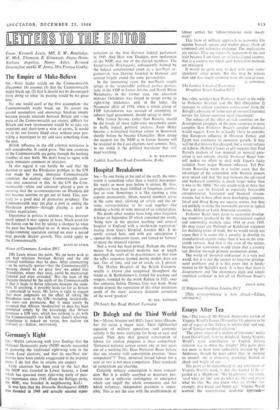Dr Balogh and the Third World
Sur,—Messrs Streeten and Hill's latest letter (Decem- ber 16) raises a major issue. Their lighthearted equation of military operations and economic activity is the more terrifying for being so easy and casual. They deny that general conscription of labour for civilian purposes is mass compulsion. 'Universal national service covers one or two years out of a working life. Does Professor Bauer believe that any country with conscription practices "mass compulsion"?' Thus, universal forced labour for a year or two is not mass compulsion. Their standards of compulsion are exacting.
Certainly military conscription is mass compul- sion. But it is widely accepted as necessary pro- vision for a collective contingency or emergency which can engulf the whole community and for which voluntary, independent provision is impos- sible. This is not the case with the establishment of
labour armies for labour-intensive rural invest- ment.'
This form of military approach to economic life equates barrack square and market place, chain of command and voluntary exchange. The implications are sinister. They are especially repugnant to me, not least because 1 am from an underdeveloped country, that is a country for which such benevolent methods are envisaged.
It would be quite easy to deal with your corre- spondents' other points. But this may be tedious now and thus divert attention from the crucial issue. E. GONENSAY The London School of Economics
Houghton Street, London If 'C2






























 Previous page
Previous page